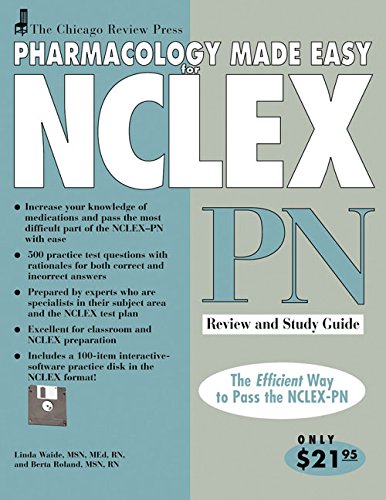Finding your suitable pharmacology games is not easy. You may need consider between hundred or thousand products from many store. In this article, we make a short list of the best pharmacology games including detail information and customer reviews. Let’s find out which is your favorite one.
Best pharmacology games
1. Pharmacology: Nursing Word Search Puzzles For Student Nurses (Volume 1)
Description
Study while on the go as you master learning names of drugs and medications by there trade and generic names while you take a break from your school books by having fun doing some crossword puzzles. For this will reinforce your learning and knowledge of the pharmaceutical world to become the Nurse your are intended to become.2. Pharmacology: Nursing Crossword Puzzle For Student Nurses (Volume 1)
Description
Study tools for medications generic and trade names. Repetition, repetition, repetition can help you master your skills in pharmacology.3. Pharmacology: The NCLEX Trainer: 100+ Specific Practice Questions & Rationales, Content Review, and Strategies for Test Success
Description
Achieve exam success with Pharmacology: The NCLEX Trainer!
Concise content review, 100+ topic-specific practice questions, and proven tips for success.
The NCLEX Trainer exam guide begins with an outline of the topics and key facts that you need to remember for the exam. A list of subtopics is included. This is all presented with helpful notes, tips, and cautions. In section three of this guide, you can apply and test your knowledge with over 100 topic-specific practice questions. All answers to the questions are given with detailed rationales to further your knowledge and understanding of the topic. Smart study strategies are outlined in the penultimate section of this guide - this will put you on a steady path to achieving success on your NCLEX exam!
Download the NCLEX Trainer today, and kick-start your journey to NCLEX success!
4. Chicago Review Press Pharmacology Made Easy for NCLEX-PN Review and Study Guide (Pharmacology Made Easy for NCLEX series)
Description
5. Pharmacology: Nursing Word Search Puzzles For Student Nurses (Volume 1)
Description
Study tools for medications generic and trade names. Repetition, repetition, repetition can help you master your skills in pharmacology.6. Pharmacology for Nursing Care
Feature
Does contain the study guideDescription
A favorite among nursing students, Pharmacology for Nursing Care, 8th Edition, features a uniquely engaging writing style, clear explanations, and unmatched clinical precision and currency to help you gain a solid understanding of key drugs and their implications -- as opposed to just memorization of certain facts. Compelling features such as a drug prototype approach, use of large and small print to distinguish need-to-know versus nice-to-know content, and a focus on major nursing implications save you study time by directing your attention on the most important, need-to-know information. The new edition also features an abundance of content updates to keep you ahead of the curve in school and in professional practice.
- UNIQUE! Engaging writing style with clear explanations makes content easy to grasp and even enjoyable to learn.
- A drug prototype approach uses one drug within each drug family to characterize all members of its group to help you learn about related drugs currently on the market and drugs that will be released once you begin practice.
- UNIQUE! Special Interest Topic boxes address timely issues in pharmacology and connect pharmacology content with current trends.
- Large print/small print design distinguishes essential "need-to-know" information from "nice-to-know" information.
- Limited discussion of adverse effects and drug interactions keeps your limited study time focused on only the most clinically important information.
- Reliance on up-to-date evidence-based clinical guidelines ensures that therapeutic uses are clinically relevant.
- Integrated and summarized nursing content demonstrates the vital interplay between drug therapy and nursing care.
- Coverage of dietary supplements and herbal interactions equips you to alert patients and caregivers to the potential dangers of certain dietary supplements, including interactions with prescribed and over-the-counter drugs and herbal therapies.
- Additional learning features provide a touchstone for study and review as you complete reading assignments and build a foundation of pharmacologic knowledge.
- Updated drug content and related nursing content reflect the very latest FDA drug approvals, withdrawals, and evidence-based therapeutic uses.
- Expanded and updated content on medication safety prepares you to pass the NCLEX Examination and practice safe medication administration in the clinical setting.
- Expanded coverage of pharmacogenomics introduces you to the many different genetic factors that influence drug therapy.
- New information on electronic prescribing primes you for nursing practice in the 21st century, as electronic prescribing systems become more common in the clinical setting.
- Updated coverage of evidence-based clinical treatment guidelines, particularly those for cholesterol and diabetes management, promotes evidence-based practice in nursing pharmacology.
- New chapter (Chapter 39) on nicotine and tobacco abuse highlights our growing understanding of the unique addictive properties of nicotine and the nursing considerations for helping patients improve their health through smoking cessation.
- Canadian drug names are now included and highlighted with a maple leaf icon to familiarize U.S readers with other trade names they may see and to make the book more useful for Canadian students.
I. INTRODUCTION
1. Orientation to Pharmacology
2. Application of Pharmacology in Nursing Practice
3. Drug Regulation, Development, Names, and Information
II. BASIC PRINCIPLES OF PHARMACOLOGY
4. Pharmacokinetics
5. Pharmacodynamics
6. Drug Interactions
7. Adverse Drug Reactions and Medication Errors
8. Individual Variation in Drug Responses
III. DRUG THERAPY ACROSS THE LIFESPAN
9. Drug Therapy During Pregnancy and Breast-Feeding
10. Drug Therapy in Pediatric Patients
11. Drug Therapy in Geriatric Patients
IV. PERIPHERAL NERVOUS SYSTEM DRUGS
12. Basic Principles of Neuropharmacology
13. Physiology of the Peripheral Nervous System
14. Muscarinic Agonists and Antagonists
15. Cholinesterase Inhibitors and Their Use in Myasthenia Gravis
16. Drugs That Block Nicotinic Cholinergic Transmission: Neuromuscular Blocking Agents and Ganglionic Blocking Agents
17. Adrenergic Agonists
18. Adrenergic Antagonists
19. Indirect-Acting Antiadrenergic Agents
V. CENTRAL NERVOUS SYSTEM DRUGS
20. Introduction to Central Nervous System Pharmacology
21. Drugs for Parkinson's Disease
22. Alzheimer's Disease
23. Drugs for Multiple Sclerosis
24. Drugs for Epilepsy
25. Drugs for Muscle Spasm and Spasticity
26. Local Anesthetics
27. General Anesthetics
28. Opioid (Narcotic) Analgesics, Opioid Antagonists, and Nonopioid Centrally Acting Analgesics
29. Pain Management in Patients with Cancer
30. Drugs for Headache
31. Antipsychotic Agents and Their Use in Schizophrenia
32. Antidepressants
33. Drugs for Bipolar Disorder
34. Sedative-Hypnotic Drugs
35. Management of Anxiety Disorders
36. Central Nervous System Stimulants and Attention-Deficit/Hyperactivity Disorder
37. Drug Abuse I: Basic Considerations
38. Drug Abuse II: Alcohol
39. Drug Abuse III: Nicotine and Smoking NEW!
40. Drug Abuse IV: Major Drugs of Abuse Other Than Alcohol and Nicotine
VI: DRUGS THAT AFFECT FLUID AND ELECTROLYTE BALANCE
41. Diuretics
42. Agents Affecting the Volume and Ion Content of Body Fluids
VII: DRUGS THAT AFFECT THE HEART, BLOOD VESSELS, AND BLOOD
43. Review of Hemodynamics
44. Drugs Acting on the Renin-Angiotensin-Aldosterone System
45. Calcium Channel Blockers
46. Vasodilators
47. Drugs for Hypertension
48. Drugs for Heart Failure
49. Antidysrhythmic Drugs
50. Prophylaxis of Coronary Heart Disease: Drugs That Help Normalize Cholesterol and Triglyceride Levels
51. Drugs for Angina Pectoris
52. Anticoagulant, Antiplatelet, and Thrombolytic Drugs
53. Management of ST-Elevation Myocardial Infarction
54. Drugs for Hemophilia
55. Drugs for Deficiency Anemias
56. HematopoieticAgents
VIII. DRUGS FOR ENDOCRINE DISORDERS
57. Drugs for Diabetes Mellitus
58. Drugs for Thyroid Disorders
59. Drugs Related to Hypothalamic and Pituitary Function
60. Drugs for Disorders of the Adrenal Cortex
IX. WOMEN'S HEALTH
61. Estrogens and Progestins: Basic Pharmacology and Noncontraceptive Applications
62. Birth Control
63. Drug Therapy of Infertility
64. Drugs That Affect Uterine Function
X. MEN'S HEALTH
65. Androgens
66. Drugs for Erectile Dysfunction and Benign Prostatic Hyperplasia
XI. ANTI-INFLAMMATORY, ANTIALLERGIC, AND IMMUNOLOGIC DRUGS
67. Review of the Immune System
68. Childhood Immunization
69. Immunosuppressants
70. Antihistamines
71. Cyclooxygenase Inhibitors: Nonsteroidal Anti-inflammatory Drugs and Acetaminophen
72. Glucocorticoids in Nonendocrine Disorders
XII. DRUGS FOR BONE AND JOINT DISORDERS
73. Drug Therapy of Rheumatoid Arthritis
74. Drug Therapy of Gout
75. Drugs Affecting Calcium Levels and Bone Mineralization
XIII. RESPIRATORY TRACT DRUGS
76. Drugs for Asthma
77. Drugs for Allergic Rhinitis, Cough, and Colds
XIV. GASTROINTESTINAL DRUGS
78. Drugs for Peptic Ulcer Disease
79. Laxatives
80. Other Gastrointestinal Drugs
XV. NUTRITION
81. Vitamins
82. Drugs for Weight Loss
XVI. CHEMOTHERAPY OF INFECTIOUS DISEASES
83. Basic Principles of Antimicrobial Therapy
84. Drugs That Weaken the Bacterial Cell Wall I: Penicillins
85. Drugs That Weaken the Bacterial Cell Wall II: Cephalosporins, Carbapenems, Vancomycin, Telavancin, Aztreonam, Teicoplanin, and Fosfomycin
86. Bacteriostatic Inhibitors of Protein Synthesis: Tetracyclines, Macrolides, and Others
87. Aminoglycosides: Bactericidal Inhibitors of Protein Synthesis
88. Sulfonamides and Trimethoprim
89. Drugs Therapy of Urinary Tract Infections
90. Antimycobacterial Agents: Drugs for Tuberculosis, Leprosy, and Mycobacterium avium Complex Infection
91. Miscellaneous Antibacterial Drugs: Fluoroquinolones, Metronidazole, Daptomycin, Rifampin, Rifaximin, Bacitracin, and Polymyxins
92. Antifungal Agents
93. Antiviral Agents I: Drugs for Non-HIV Viral Infections
94. Antiviral Agents II: Drugs for HIV Infection and Related Opportunistic Infections
95. Drug Therapy of Sexually Transmitted Diseases
96. Antiseptics and Disinfectants
XVII. CHEMOTHERAPY OF PARASITIC DISEASES
97. Anthelmintics
98. Antiprotozoal Drugs I: Antimalarial Agents
99. Antiprotozoal Drugs II: Miscellaneous Agents
100. Ectoparasiticides
XVIII. CANCER CHEMOTHERAPY
101. Basic Principles of Cancer Chemotherapy
102. Anticancer Drugs I: Cytotoxic Agents
103. Anticancer Drugs II: Hormonal Agents, Targeted Drugs, and Other Noncytotoxic Anticancer Drugs
XIX. ADDITIONAL IMPORTANT DRUGS
104. Drugs for the Eye
105. Drugs for the Skin
106. Drugs for the Ear
107. Miscellaneous Noteworthy Drugs
XX. ALTERNATIVE THERAPY
108.Dietary Supplements
XXI. TOXICOLOGY
109. Management of Poisoning
110. Potential Weapons of Biologic, Radiologic, and Chemical Terrorism
7. The Stoner Puzzle Stash: An Activity Book for the High-Minded
Feature
WORKMAN PUBLISHINGDescription
Youre highnow what? Announcing the perfect companion of puzzles and games for anyone who enjoys getting baked now and then.
Here are word searches, including Munchie-Mania (Dude, can you find nachos, Steakumms, cake icing, Doritos?). Mazes, like the Customs Quagmirecan you pilot a van made out of marijuana from Mexico to San Francisco? Fill-in-the-Pictures: Oh no! Cheech just singed off his mustache! Can you draw it back on? Plus the super-simple, super-amusing activity Trace Your Face: Tilt forward from the couch until your face rests in the empty pizza box on the coffee table. Pick up a pencil and, holding the pointy side down, trace your face. This activity is not timed.









